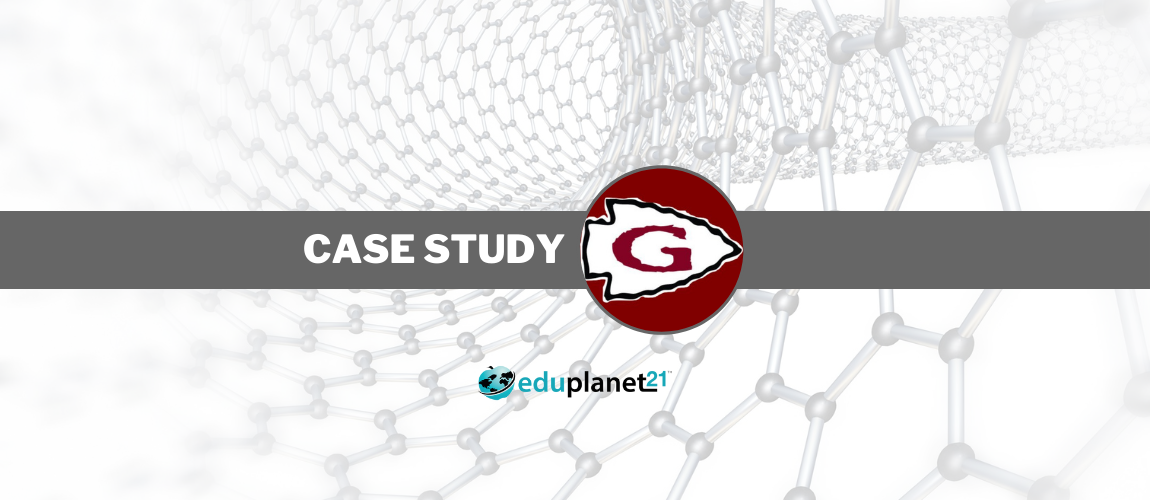Where They Started:
At the top of the Gettysburg Area School District site is a clear articulation of the mission and goals of the district which blend core areas such as: focusing on student achievement, creating safe and healthy environments for learning, embracing the community as a critical partner and the commitment to helping students develop the skills they need to be successful in an ever-changing landscape. With these greater goals in mind, Instructional Technology Director, Ann Baum, shared with me just some of the ongoing work underway bridging leadership, technology, and curriculum.
Ann and her team of Instructional Coaches, with support from district leadership, are especially focused on the effective ways to use technology in an instructionally sound way that marries research, practice and the contextual needs of her district. This work includes reimaging an integrated curriculum tied explicitly to student outcomes, project-based assessment, development of social emotional skills and creating the corresponding professional learning opportunities necessary for educators to successfully fulfill the district’s aspirational goals.
Covid Delays:
The initial COVID-19 wave forced most districts to pivot quickly to meet the needs of their community. The Gettysburg Area School District was no different. While they had been serving the instructional needs of approximately 20 students in their cyber (remote) program, practically overnight that number grew to 600 students all remote with various levels of home support and access to technology. That number has fluctuated over time as schools began to reopen with safety procedures in place and a better understanding of transmission rates. Even now, approximately 62 students are still receiving fully cyber instruction.
Prior to COVID, Ann and her team of Instructional Coaches ran professional learning sessions geared towards aligning district level instructional goals utilizing the Understanding by Design (UbD) framework across all grade levels, secondary, middle and elementary, and select content areas through the Eduplanet21 platform. Personalization and differentiation were key to the instructional design of this professional development and Ann and her team were pleased to also have access through the platform to relevant, self-paced online courses, called institutes, that include, among others, modules on UbD, Habits of Mind, Student Motivation and Cultural and Linguistic Diversity.
While “everything stopped'' during COVID, getting back into the swing of things was a little less rocky for those grade level and content teams that had already been introduced to Eduplanet21’s curriculum platform and accompanying professional learning institutes. The flexibility of the platform allowed each group at various stages to continue at their own pace. As Ann explained, “some subjects [teams] are in the UbD modules, some are working on Stage 1 with the Instructional Coaches and administration, and some are working directly with building administrators, instructional coaches, and me on Stage 2. We wouldn’t have been able to do this without Eduplanet21.” How educators engaged in their own professional growth mirrored the flexibility required when teaching through a pandemic. Cohorts continue to have internal and external discussions, as enabled by the platform, to learn from each other and what worked for prior teams.
Learning As Cycle:
“The biggest thing we’ve learned is it takes a lot of time,” Ann shared. Before the disruption of COVID, the district, excited to dive into the work of creating a robust integrated curriculum, thought they could tackle the three discreet and interconnected stages of UbD in one year. But now, they’ve realized that to do it right, each stage would take about a year. The team also grew in their understanding that a revised curriculum is not a destination, but a continuous and evolving journey.
Redefining education as a progression sounds simple. Truthfully, it requires a new vocabulary, interpreting internal and external factors with a grace and gratitude mindset and getting up each day to try again – with student outcomes as the North Star. Leaders like Ann Baum at the Gettysburg Area School District have their sights set on things like a whole child approach that considers the academic and social emotional needs of students. They talk about soft skills as the critical essential skills necessary to help each child navigate their way in a new world.
Listening to Ann describe the many lessons learned through recent years, three positive themes emerged.
- First, the world is ever-changing and as educators we need to be flexible enough to move fluidly to guide our students and one another.
- Secondly, embracing a growth mindset can help us and our students approach each day with a lens of change as a constant and learning as a process.
- Thirdly, the right technology is critical to our ability to create flexible learning opportunities that meet the ever-changing needs of educators and our students.
Want to learn more about how Eduplanet21 can help your school or district? Contact us and request a demo.
 Login
Login
